- Home
- Sebastian Faulks
Human Traces Page 42
Human Traces Read online
Page 42
AT THE END of June, Thomas received a telegram. ‘Am back in Vienna. K.’ He wired a reply at once, inviting her to come to the Schloss. He might even offer her work there, he thought, but wanted to see how Jacques would respond to her presence. He had a delicate course to steer: he did not wish to humiliate or enrage Jacques, but he did want him to understand the gravity of his error. Meanwhile, there was a shadow between them; there was something that needed to be resolved; and when he was certain that Jacques was in a sufficiently robust frame of mind, he told him about the diagnosis of rheumatic fever.
Jacques became agitated and pale as Thomas went over the steps by which he and Maierbrugger had arrived at their conclusion. He nodded gravely, and Thomas, like a doubtful assassin, felt pity and embarrassment as he watched.
‘I see,’ said Jacques finally. ‘So when I asked you for an explanation of her joint pains you already had this one.’
‘Yes. I did not say so at the time because—’
‘I understand why.’
They were in Jacques’s consulting room. He got up from where he had been sitting at the desk and walked to the window. He looked out over the gardens, but he said nothing.
Thomas said, ‘Of course, we shall probably never know the exact diagnosis. Perhaps none of us is right.’
‘Perhaps.’
‘But I knew that you would want to be aware of this severe complication, if only so that you can develop your theory in the light of it.’
‘Yes,’ said Jacques. ‘Yes indeed.’ He seemed far, far away.
When Jacques turned at last to face him, Thomas found it hard to meet his eye. He thought of the sands at Deauville and he felt weary, as though he had heard the first call of middle-age, inviting him to subside into comfortable self-mockery, recognise the embrace of defeat and to indulge his own – after all, only human – failings. But he had seen men like Faverill go that way, and the outlines of their modesty and good humour were in fact a deception because they were etched with the acid of regret. He himself would never give up.
‘We may have lost a battle,’ he said.
‘Perhaps only a skirmish,’ said Jacques. ‘But the war, you were doubtless going to say, is not over.’
‘Of course not. I wanted to ask you something, while we are on this subject. Katharina may come back to the schloss to stay for a little while, just a holiday. Or I might ask her to do some of Sonia’s work while she is pregnant. She is evidently rather good at that sort of thing.’
‘Evidently.’
‘But would you mind?’
‘Do you think that every time I saw her in the cloister I would doubt my own abilities?’
‘I don’t know.’
‘Would she be like a raven on the battlement? A bird of ill omen always in the courtyard?’
Thomas laughed. ‘I very much hope not. She is a very . . . fine woman as you yourself pointed out – most eloquently – in your case history.’
‘I remember. She made a good impression.’
‘So what do you think?’
‘I think that you have presented me with a choice. Either I recognise Katharina’s qualities and humbly see what I can learn in retrospect from her ailments or I allow myself to withdraw into some kind of unscientific isolation with a closed mind and an embittered heart.’
‘That is putting it a little starkly.’
‘A little. But it is a stark choice. And quite an easy one.’
‘You mean—’
‘She is undoubtedly a person of superior gifts, Thomas. Ask her to do whatever you like, provided you consult Sonia. Now please leave me for a moment.’
Sonia was reading on her bed, with the shutters and windows open, giving her a view down towards the lake. She was wearing a white cotton shift and held the book on top of her distended abdomen. Occasionally, she put it down, lifted the shift and ran her fingers over the skin, stretched to near-transparency, beneath which the veins ran like the streams of a blue delta. She seldom felt the baby move, but it seemed to be growing at a vigorous rate and she was anxious about how much bigger she would have to grow before October. Already she had started to shuffle a little when she walked, while her feet turned outwards and her hand reflexively went to the small of her back for extra support when she hauled herself out of a chair. The heat of the summer made her feel that she would like to lie all day in the shallows of the lake, like a basking porpoise.
Despite these discomforts, she had seldom felt more purposeful. She ate amply of Frau Egger’s cooking, though could not bear the taste of wine and used her condition as an excuse to turn down the bony river fishes that were otherwise destined for the lunchtime tray. In the afternoon, she went down into the office next to the waiting room, where she corrected Lisl’s spelling and brought the accounts up to date. In the evenings, she sat with Jacques and Thomas and caught up with news of the Schloss; she sensed the strain between them and was able to lighten it by appealing to shared memories of Torrington or Madame Maurel’s boarding house.
But in the mornings, she was alone with the unborn child. She lay on the bed and heard the bell-pull being answered by Lisl or Daisy, and the clatter from the nursery, where Hans was putting up new curtains and repainting the room. Josef had found a wooden crib among the furniture stored in the old stables and Sonia had had a new cot with elephants painted on the headboard made by a craftsman in the village. As she lay back, she thought of the millions of women in the world, in Africa and China and England, who were like her at that moment, absorbed by their bodies’ invisible toil, which took from her all it needed to sustain the life of something that had started as a mere idea in the nursery at Torrington (‘When I grow up I am going to have . . .’) yet now was daily turning into flesh. The size and weight, the specificity, were miraculous to her; he was not just a child, but her child, this very one; and how could you love so much a being you had never met?
She smiled briefly because these fancies did not really puzzle her; in fact, she was assailed all the time by a sense of rightness. What was happening beneath her hands seemed bizarre and in some way unexpected, yet the more she marvelled at it, the more it felt inexorable. She sighed and closed her eyes as a slight breeze came up from the lake and through the open window. This is being alive, she thought; this is what it feels like.
When Thomas knocked at the door, she quickly covered herself with a sheet. ‘Come in.’
Thomas sat at the end of the bed. ‘I wanted you to know that I have told Jacques about Katharina’s rheumatic fever.’
‘How did he take it?’
‘Philosophically. He did not like it, but he accepted it. I think there is no need to do any more. He will work out his own response, though I think he will need time.’
‘So you are not going to show him your notes on the case history?’
‘No. That would be unnecessary now. I want him to come to his own conclusions and they may be quite different from mine. The only important thing is that he understands the dangers to the patient of a theory that is too rigid. We must never forget the simple things – fevers, sore throats and so on.’
Sonia sighed. ‘I do hope he will find a way forward again. All his hopes rode on this theory.’
‘I think he will need some looking after.’
‘We will manage. The baby will be a distraction. It will occupy his mind.’
‘It will occupy all of us. There is another thing I needed to tell you, Sonia. Or to ask you, I should say. I have invited Katharina back to the schloss to stay for a week or so. I wondered whether it might make sense for her to do something to help us. She could do your morning’s work for instance.’
Sonia squinted down the bed at her brother. ‘Is that all you wanted to tell me – or to ask me? Is there something else?’
‘I . . . No. That was it.’
‘Thomas, you are blushing.’
‘Don’t be ridiculous.’
Sonia laughed. ‘It is all right, you know, Thomas. It is allowed. You are a man of thirty-six years ol
d who—’
‘Thirty-five, in fact.’
‘Who has never had so much as a dalliance or—’
‘Not recently, but—’
‘And Kitty is a considerable prospect.’
‘Prospect! You sound like Father discussing things with Mr Prendergast!’
‘I did not mean financial, I just meant that she holds out promise for the future. She is on the threshold of her life. And she seems such a studious girl as well as being—’
‘Exactly! That’s exactly what I love about her. I—’ He stopped short, hearing what he had said.
Sonia said nothing, but smiled at him. It was a long time since she had felt older, more advanced in her experience, than her younger brother.
‘So,’ he said. ‘Congratulations. You have found me out. Can you understand why I love her so much?’
‘Of course, Thomas. Have I not just said?’
‘Yes, I know, but do you really understand? It means a good deal to me that you should like her.’
‘I do not know her well, but I think that if I were a man, she is the kind of woman I should fall in love with and want to marry.’
‘You are very kind.’
‘No, I am not. I am quite selfish and hard-hearted.’
Thomas looked at her to see how serious she was. ‘Of course it is difficult with Jacques. I do not want him to be embarrassed or to see her as some kind of permanent rebuke.’
‘That is what made me suspicious,’ said Sonia. ‘I knew you would not have asked her back unless there was some particular reason.’
Thomas nodded glumly. ‘It is awkward. If I were to propose marriage and she were to accept, then presumably we should all have to have dinner together every night. And . . . Did you ever read the case history?’
‘No.’
‘Good. Do not ever be tempted to read it. But it went into detail that he may find difficult to forget.’
‘But doctors can manage these things,’ said Sonia. ‘You are capable of seeing someone in the morning, inspecting their most intimate functions, then seeing them again in the evening as a social being in a white tie. That is what doctors do. That is why we admire you. I think you will find that Jacques will manage. He is a man of great imagination. He has a creative soul.’
‘You mean he will be able to imagine that he has never met her before?’
‘It would not surprise me. If that is what he has to do. To him she was a patient, Thomas. That is all.’
Thomas stood up. ‘I must go and get a room made ready for her.’
‘Yes,’ said Sonia. ‘But before you go, I must say that I am not sure about her working here. She may do some office work eventually, if everything goes to plan, but I don’t want to give up all I have done. The accounts, for instance.’
‘We will tread gently.’
When Kitty arrived at the mainline station, Thomas was waiting. He had forgotten, when he held her in his arms, how slight she was: even in her travelling cloak and jacket, he felt he could have crushed her. On the other hand, the set of her blue eyes was precisely as he remembered, and so was the scent of her skin. She had brought only two suitcases and no trunk, as though not wishing to presume anything about the length of her stay, but in the trap on the way back to the Schloss, her eyes were large with questions.
‘We have put you in a bedroom in the main house,’ said Thomas, ‘on the same side as me. My room is at the front, yours is right at the back, overlooking the cloister and the South Court.’
‘I love that little courtyard.’
‘So your room faces west, and you have a view of the mountains as well.’
‘It sounds perfect.’
‘We can move you if—’
‘Don’t fret, Thomas.’
Josef whipped the horses on as they began to climb from the valley. Thomas tried to explain what had passed between Jacques, Sonia and himself regarding Kitty’s visit; he told her of the delicate negotiation and of how Sonia felt sure that Jacques would be able to forget what had gone before.
Kitty looked amused. ‘My dear Thomas, you are making a fuss about this. For myself, I have already forgotten almost all the details of my previous consultations. I have no more interest in them than in records of my childhood dentistry.’
Thomas laughed. Mind you, he thought to himself, she has never read the case history; in fact, she does not even know of its existence. ‘So what are you interested in?’ he said.
‘The future. A healthy future without pains and fevers. You forget that for a former invalid it is wonderful just to be cantering up a hill with the summer breeze blowing through the window.’
‘Dear God, Kitty. I love you so much it makes me want to burst out laughing. I feel that if you are here, nothing can go wrong.’
‘Nothing will go wrong, Thomas. Why should it?’
‘Because . . .’ Hewas about to say, ‘because that is the way life is designed’, but did not want to appear gloomy. ‘Nothing.’
Kitty dined with the three of them that evening, and Thomas felt surprisingly little awkwardness. Jacques asked Kitty about her mother’s family in London and told her about his one visit to England; Kitty asked Sonia about her plans for the baby and what names she had considered for it. The chestnut gateau had already been cleared by the time Thomas managed to make any contribution of his own to their exchange. Afterwards, he took Kitty outside into the gardens, where they walked down over the sloping lawns towards the mountains in the west.
Eventually the grass gave way and rolled down into a kind of ditch that formed a natural boundary; beyond it was a paddock, and after that some dark green cow pastures before the land began to rise again up into the foothills of the mountains. Thomas took off his jacket and spread it on the ground for Kitty to sit on; then he placed himself next to her and she leaned her head on his shoulder.
‘Did you find a job in Vienna?’ he said.
‘No, I . . . I hardly had time.’
‘And an apartment?’
‘I did look in the paper. I have brought it with me. But I can stay at my mother’s house for the time being.’
‘How long were you in Vienna?’
‘Three days. Two days.’
‘Not long, then.’
‘No. I was in a hurry to come back here.’
‘Why?’
‘To see if things were as I remembered them.’
‘And are they?’
‘Yes. Exactly so.’
Thomas looked down and pulled a stalk of grass out of the ground.
‘Do you find my work interesting, Kitty?’
‘Very much. And your partner’s work. I told you that I read his lecture.’
‘Yes.’
‘I may have been lucky. A surgeon’s knife removed my minor problem. But I think there is a great deal in his psychophysical resolution.’
Thomas smiled. Her perversity was liberating. ‘But,’ he said, ‘do you not think it faintly ridiculous that the two of us should be beating our heads against a rock?’
‘What do you mean?’
‘We are trying to answer questions which, at heart, we suspect we cannot answer.’
Kitty put her hand on his arm. ‘You might, Thomas, you might. As you explained to me, there are moments when truths are revealed – sudden leaps forward. I expect they come when people have for a long time been beating their heads on a rock.’
‘But you would not think me ridiculous?’
‘I would not think you ridiculous, no. I should probably need to read Mr Darwin’s books, but I would happily do that.’
‘You would do that just for me?’
‘Of course.’
Relief made Thomas pause. To think that someone would share his boneheaded convictions and his peculiar, blind ideas . . . He saw that he had been half in love with Kitty from reading her case history, and that being close to her in person had inflamed the feeling; but the decisive moment came when she showed such interest in his work. She had questioned him and pu
shed him until that strange release had come, and he had told her of his now-silent voice: only Katharina had been able to connect the different parts of him.
‘But,’ said Kitty, standing up, ‘you did not say if what.’
‘What do you mean, “if what”?’
‘You said, “You would not think me ridiculous?” “Would” is a conditional, and I wondered what the other part of the sentence was, the “if” part.’
‘You are quite a grammarian,’ said Thomas.
‘So, what was it?’
‘I feel an idiot. It is too soon, much too soon, and you have been through so much that you need time to recuperate. In fact, as your doctor, I insist that you—’
‘You are not my doctor. You have kissed me. I am asking to be transferred to Dr Bernthaler’s list. I am perfectly well. I have had several weeks’ rest and I am now ready to work.’
Thomas pushed himself up into a kneeling position and took her hand. ‘In that case, may I . . . Would you think me absurd if . . .’
Kitty shook her head, her eyes stinging. ‘Not at all.’
‘Will you marry me?’
‘I would be honoured,’ she said. ‘So very honoured.’
Thomas stood up and wrapped his arms round her. As she laid her head on his chest, he lifted up his eyes to the hills, but, despite all he believed, he could see no end to this happiness.
They agreed that the wedding should take place in December, when Sonia would be recovered from the birth. The difficulty was in telling the others. It would not seem right for Kitty to remain at the schloss unless she was either engaged to be married or was employed there. However, Thomas did not want to push her into Sonia’s place, nor did he yet want to break the news of his coming marriage to Jacques. It seemed precipitate, and he wanted nothing to deflect their energies and attention from the birth. Eventually, he and Kitty agreed, with reluctance, that she should go back to Vienna until after the baby was safely born, returning only for the occasional visit to make Sonia and Jacques aware that she was someone who would be part of their future. Thomas stilled Sonia’s questioning by telling her that everything was well between him and Kitty, but that she still had personal matters to attend to; he assured Sonia that she would be the first to know of any development, and she was satisfied with his promise.

 Devil May Care
Devil May Care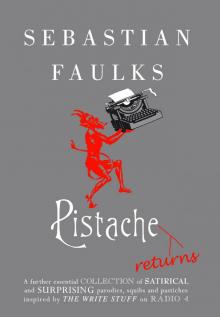 Pistache Returns
Pistache Returns The Girl at the Lion D'Or
The Girl at the Lion D'Or Pistache
Pistache Jeeves and the Wedding Bells
Jeeves and the Wedding Bells A Week in December
A Week in December The Vintage Book of War Stories
The Vintage Book of War Stories Engleby
Engleby Birdsong
Birdsong Jack Firebrace's War
Jack Firebrace's War Where My Heart Used to Beat
Where My Heart Used to Beat A Possible Life
A Possible Life The Fatal Englishman: Three Short Lives
The Fatal Englishman: Three Short Lives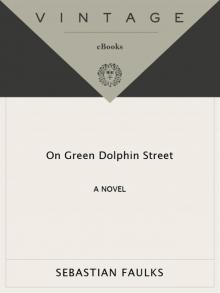 On Green Dolphin Street
On Green Dolphin Street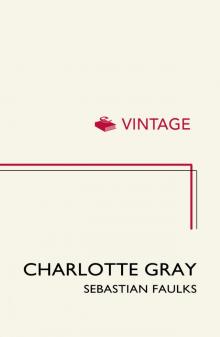 Charlotte Gray
Charlotte Gray A Broken World: Letters, Diaries and Memories of the Great War
A Broken World: Letters, Diaries and Memories of the Great War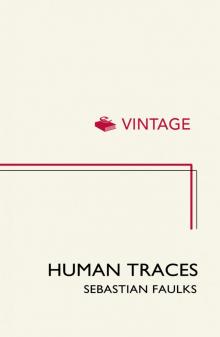 Human Traces
Human Traces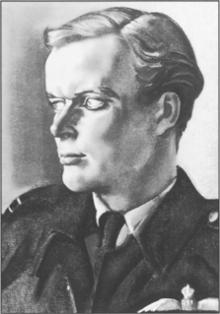 The Fatal Englishman
The Fatal Englishman A Broken World
A Broken World Paris Echo
Paris Echo War Stories
War Stories Girl At the Lion d'Or
Girl At the Lion d'Or